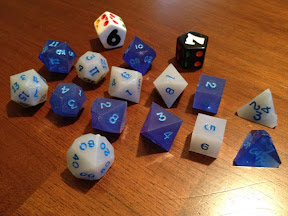Since Brendan asked, here’s a run-down of the variant rules I’m using in my Skylands campaign.
I start with the c. 1981 D&D Basic & Expert Sets. (Those edited by Tom Moldvay, Zeb Cook, and Steve Marsh.) If you aren’t familiar with those sets, some of this may be unclear, but if you have some familiarity with any edition of D&D—especially TSR-era D&D, then I think you’ll get the jist of it.
Strength does not provide a “to hit” bonus; only a damage bonus. There is no intelligence ability score. The “full” Dexterity modifier applies to individual initiative. The wisdom modifier applies to all saving throws.
Speaking of saving throws, I’ve gone the Swords & Wizardry route of having a single one.
There’s none of that “lower one score two point to raise another score one point” stuff. But players can swap a pair of scores.
There are no ability score based XP bonuses or penalties.
The cleric class is renamed “crusader”. I use “mage” rather than magic-user.
There are no restrictions on the weapons usable by crusaders, mages, or thieves.
Thieves do not get a find traps or remove traps skill. The move silently, hide in shadows, and climb sheer surface skills are explicitly called out as extraordinary abilities. Anyone can move quietly, hide, or climb. And a thief who fails a move silently roll is still moving quietly.
No dwarves or halflings. (Which is more of a setting thing than a system thing.) There are gnome PCs. These are mainly following the guidelines for gnome PCs from the Rules Cyclopedia, but they also get cantrips (v.i.).
Elf lifespans are no longer than human lifespans. (The Basic/Expert Sets don’t directly address elf lifespans, though there is a side comment about them having long lifespans.) Gnomes lifespans are about half that of humans.
Gnomes and elves can see in the dark. It isn’t “infrared” or “ultraviolet” vision. It isn’t “low light” vision. It isn’t limited to some distance.
Multiclassing is allowed (but not encouraged). The player can divide XP earned between the classes. Generally, the most favorable aspect of each class is used. Note that max hp must be tracked for each class separately. The character will use the highest max hp value from their classes.
Max hp at first level.
The lawful and chaotic alignments indicate whether the character supports or subverts order and civilization. Crusaders must be lawful.
Players can select “secondary skills” as in AD&D. If multiple are selected, one should be designated “primary”. (I’m thinking about calling them “background skills” since “primary secondary skill” sounds silly.)
I’m using the cantrips from Mike & Liz Stewart. Mages & gnomes start with three to six cantrips. Elves can learn them if they find someone to teach them. There’s no limit on how many cantrips a caster can use. They don’t need to be prepared, and they aren’t “lost” when cast.
Elves and mages begin with two to four spells.
For determining initial cantrips and spells, we did this: First the player picks. (Three for cantrips; two for spells.) Then the player rolls. (Again, three for cantrips, two for spells.) Duplicates are not rerolled.
I’ve switched to a “silver standard”. Prices that are in gp in the books are in sp instead. Platinum is unknown. Electrum could show up. Coins are 70 to the pound.
Mêlée weapons follow this post where the price depends upon the “stats” and the description is left up to the player. And this post covers fighting with two weapons.
A natural 20 on an attack roll grants a free attack. (We already had three hits by one PC in one round during a tournament mêlée.)
I’m using the “shields shall be splintered” rule. Metal shields used this way end up damaged and unusable but can be repaired for half the price of a new metal shield.
I’m using my injury table. Four hours of sleep restore half a character’s hp.
One roll on the injury table for every 10 feet fallen.
1 sp = 1 XP. I’m using 100 XP per HD for monsters defeated. With my usual: Defeat is interpreted liberally, but you only get XP for defeating the same individual monster once.” There may also be XP awards for various achievements. (Nothing specific yet.)
Brand new PCs start at first level, but PCs that replace a dead PC start with half the XP of the old PC.
A player can name their character’s heir, which must include a name and a relationship to the PC. If, after the PC dies, the player creates the heir, that PC will have legal right to the former PC’s stuff.
I raised the chance of magic research failure to 20% with the possibility that rare materials or the discovery of arcane secrets might lower it.
Being raised from the dead will cost a point of constitution.
Update: At the end of the document I gave the players I tried to give the credit due... Dave Arneson, Gary Gygax, Tom Moldvay, Stephen Marsh, David Cook, Frank Mentzer, Dan Proctor, James Raggi III, Dan Collins, Erin D. Smale, J. Brian Murphy, and Mike & Liz Stewart. (I hope I didn’t miss anyone I borrowed a rule from.)





